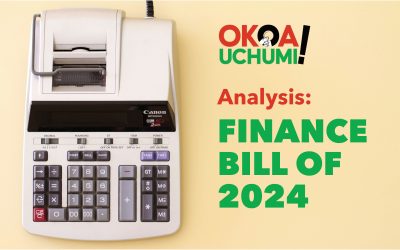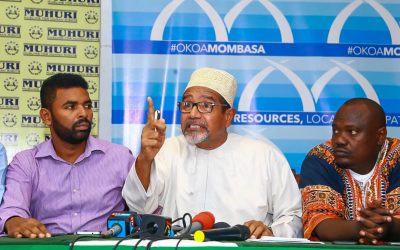On 2 November 2019, the Okoa Mombasa Coalition will mark its official launch and inaugurate a campaign to ensure that communities and local residents participate effectively in the use of local resources. The launch will take place at the Technical University of Mombasa beginning at 9am. The keynote speaker will be Dr. David Ndii. Other speakers include Prof Yash Pal Ghai, Maina Kiai, and local community members affected by recent government policies that have devastated Mombasa’s economy.
Okoa Mombasa Coalition is a group of individuals and organizations that have united out of concern for the livelihoods and wellbeing of the residents of Mombasa. The Coalition came together on 2 August 2019 in response to the implementation of two key policy decisions: the directive forcing Kenya-bound cargo to be shipped from Mombasa Port via the Standard Gauge Railway (SGR), and the move to privatise the Port’s Container Terminal 2 (CT2). Residents who were negatively affected by these decisions were not given an opportunity to participate in the decision-making process as mandated by the Constitution.
The SGR cargo directive has hit the Mombasa economy particularly hard, as detailed in Okoa Mombasa’s factsheet. It is estimated that just three sectors – long distance trucks, lubricants and fuels, container freight stations – have suffered roughly Kshs 33.3B in lost revenue since its implementation. This translates to 16% of Mombasa County’s GDP, a loss the County can ill afford. These statistics do not account for losses in other sectors such as motor vehicle and truck dealerships, motor vehicle service centers, trailer manufacturers, fuel service stations, mechanics, warehousing businesses, clearing and forwarding agencies, spare parts dealers, car washes, restaurants and other eateries, hotels, residential accommodations and commercial properties, informal sector kiosks, hawkers and produce vendors etc, which would compound the losses.
Further, if efforts to privatise the state-of-the-art CT2 come to fruition, at least 3,000 people, directly and indirectly, are expected to lose their jobs. For more about the negative consequences of privatizing CT2, see our factsheet.
Mombasa Port is a natural harbor and resource in the same way that the Central part of Kenya is endowed with a climate suitable for tea and coffee growing, and Turkana has oil. Mombasa should not be discriminated in benefiting from its resources.
“The issues facing Mombasa have repercussions that stretch beyond the Coast region,” said Khelef Khalifa, Chairman of Muhuri, a member of the Coalition. “They raise broader questions for all Kenyans about who controls local resources; local residents’ role and space to participate in decision-making around these resources; and ultimately the question of constitutionally-mandated devolution. The Okoa Mombasa Coalition launch aims to begin a conversation and campaign that will respond to these questions.”
Okoa Mombasa Coalition’s subsequent campaign will amplify the voices and the struggles of the residents of Mombasa and the Coast region as they fight for economic independence. In partnership with others, the Coalition will join Kenyans in general as they oppose the hollowing out of the economy and the deliberate deterioration of their livelihoods.
Okoa Mombasa hopes to advocate for public participation in the use of local resources and the strengthening of devolution in the following ways:
- Peaceful assemblies including protests and demonstrations that bring attention to the issues of concern;
- Litigation on Constitutional questions around the control and use of local resources such as the Port of Mombasa;
- Carrying out research, raising awareness and building the capacity of residents to better understand, organize and demand for change.
Current campaign members include InformAction, Muslims for Human Rights (Muhuri), Dockworkers Union (DWU), Kenya Long Distance Trucks Union, Kenya Transporters Association (KTA), Haki Yetu, Fast Action Business Community Movement and Human Rights Watch.
We invite all interested individuals, organisations and institutions to become part of this important campaign and to advocate for change.
If you are interested, please email us at: okoamombasa@gmail.com Follow us on: https://twitter.com/OkoaMombasa and https://www.facebook.com/OkoaMombasa
For a PDF version of this press release, please click here.


